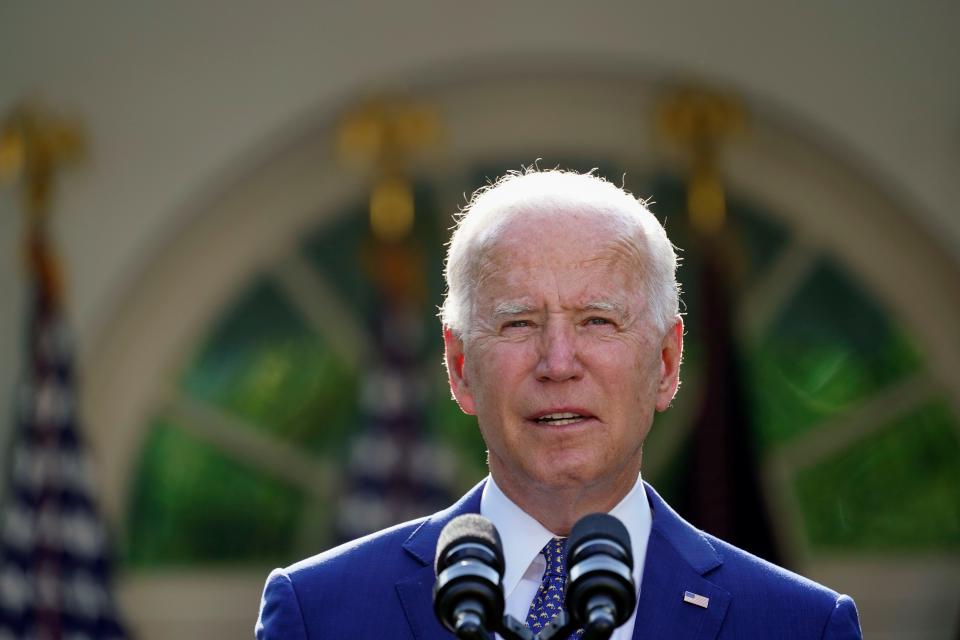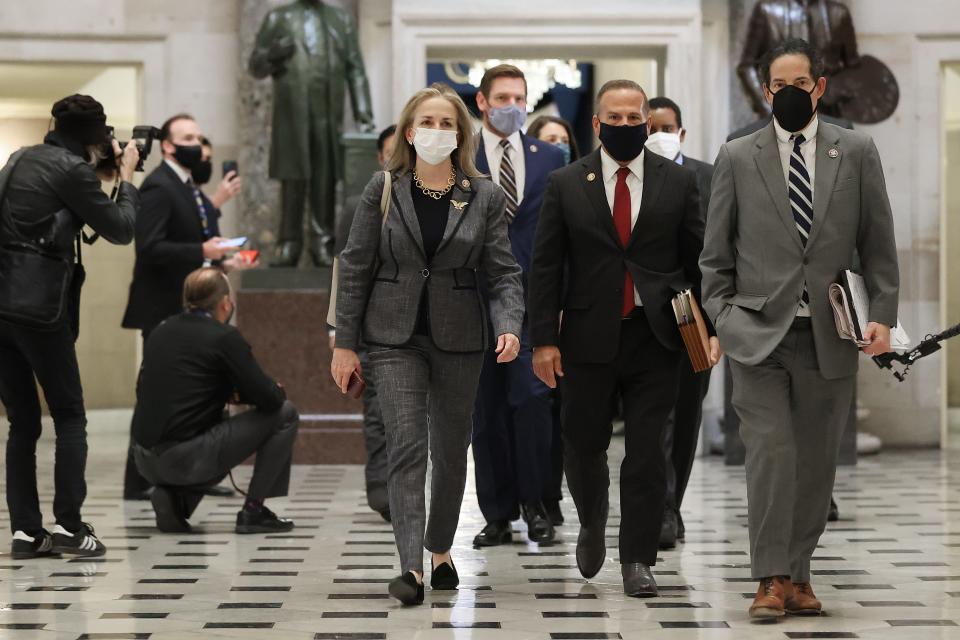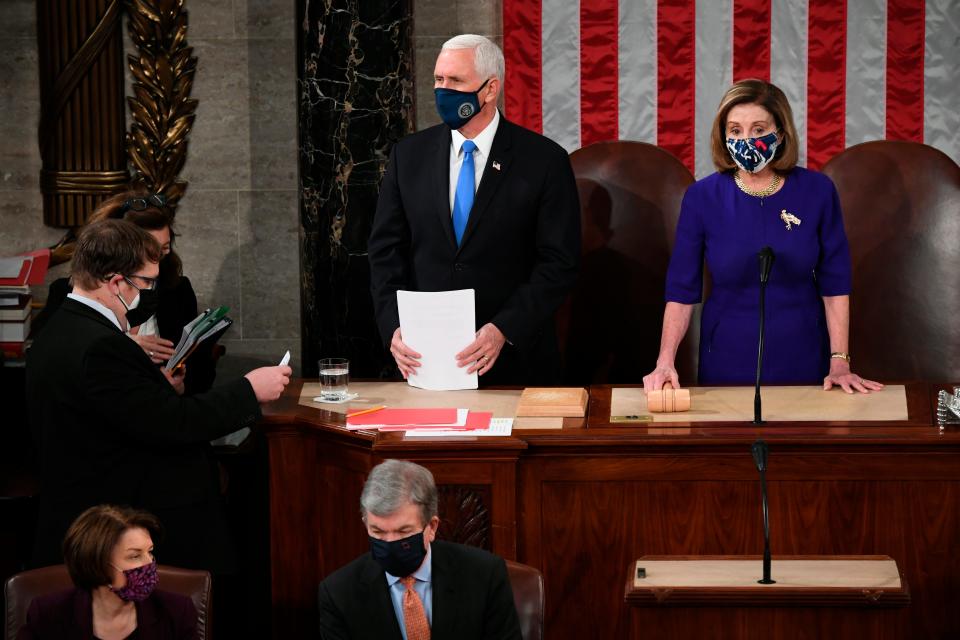The first test of Joe Biden's presidency came on Jan. 6. Can he step out from its shadow?
- Oops!Something went wrong.Please try again later.
- Oops!Something went wrong.Please try again later.
- Oops!Something went wrong.Please try again later.
A year ago, President-elect Joe Biden was huddling with his advisers in his hometown of Wilmington, Delaware, preparing to deliver a speech on the economy – far from percolating tensions in Washington, D.C.
But as images of rioters brandishing flagpoles and violently barreling through police barricades at the U.S. Capitol unfolded on television, it became clear Biden would have to nix his economy speech for something else entirely.
Suddenly, Biden's campaign rhetoric about restoring democracy and healing a divided nation crashed headfirst into a horrific political reality: the worst attack on the U.S. Capitol in more than 200 years – and a direct assault on the foundation of American governance.
"Fundamentally, what we talked about for the entire campaign had really just become very much vivid and alive that day,” recalled Mike Donilon, a top Biden adviser.
Biden, who framed his campaign as the battle for the soul of the nation, has spent the last year trying to strike a balance between addressing the magnitude of Jan. 6 and refusing to let it overshadow his presidency, even as he confronted myriad other crises facing the country.
Interviews with nearly two dozen administration officials, aides, Democrats, strategists and historians depict a White House tasked with both carrying the legacy of Jan. 6, while also trying to move the country beyond the trauma of that day.
Biden had to make difficult choices he hadn't expected: Support the impeachment of the man he was about to replace, even if it would sap momentum for his agenda? Push to eliminate the filibuster so his party could counter GOP voting restrictions, enacted on the false premise that the 2020 election was rigged? Go all-in on bipartisanship to show that American democracy can still work, at the risk of alienating his party's liberal base?
A year after the attack, the events of the insurrection underscore what’s at stake for Biden and the country, a sentiment aides say that Biden sensed two years earlier when he decided to run.
“I don't think he would have said at any point – or any of us would have said – that what happened on Jan. 6 is what we would've expected to see," Donilon said. "But I think it's also true that what happened on Jan. 6 is very much in line with what he believes was at stake in the whole election."
On Thursday, Biden made a sharp pivot away from his careful balancing act as Washington marked the one-year anniversary of the Jan. 6 attack. He delivered a vivid and forceful speech pinning responsibility for the insurrection directly on former President Donald Trump, after nearly a year of refusing to utter his predecessor's name.
"Here is the truth: The former president of the United States of America has created and spread a web of lies about the 2020 election," Biden said. "He’s done so because he values power over principle, because he sees his own interests as more important than his country’s interests and America's interests, and because his bruised ego matters more to him than our democracy or our Constitution."
And, Biden, added, because "he can’t accept he lost."
He offered a detailed rebuttal debunking the former president's false claims of election fraud and said the nation could no longer afford to let those lies fester.
With election misinformation still rampant and Democrats' renewed focus on voting rights, it seems unlikely Biden will be able to step out of the shadow of Jan. 6 anytime soon. And if his speech on Thursday is any indication, the president may not want to.
More: ‘This is insane.’ Lawmakers relive Jan. 6 horror alongside fresh trauma of effort to rewrite history
More: Fact check roundup: Debunking false narratives about the Jan. 6 Capitol riot

From Charlottesville to the U.S. Capitol
Biden, a former vice president and 36-year veteran of the Senate, launched his presidential bid in April 2019 saying he was driven by the violence that unfolded at a white supremacy rally in Charlottesville, Va., over the removal of a Confederate statue.
Donilon draws a straight line from Charlottesville to the Capitol attack.
Biden felt the need to speak out, Donilon said, as he watched the citadel of democracy fall into the hands of rioters, putting at risk the lives of the House Speaker, the vice president, his former Senate and House colleagues and the Capitol Police.
He spoke of "restoration of democracy and the recovery of respect for the rule of law, and the renewal of a politics that's about solving problems – not stoking flames of hate and chaos."
It was a theme he would weave into his inauguration speech and thread throughout his first year in office as he laid out an agenda to pull the country out of the pandemic, pass sweeping legislation to improve the country's infrastructure, redesigning the social safety net and tackling climate change, and to protect voting rights and preserve election integrity – a lengthy to-do list still left largely unfinished.
More: From Oklahoma City to Jan. 6: How the US government failed to stop the rise of domestic extremism

But first, Trump's second impeachment moved forward on charges of inciting the riot, a political spectacle that delayed confirmations for Biden's nominees and hindered efforts to turn the page on the last four years.
Trump and some of his advisers also tried to block the official transition that allowed Biden's team to access briefings and other government services in the weeks before the new administration took office.
Even the inauguration served as a reminder of the challenges Jan. 6 posed to the new administration. Aides recalled boarding buses in the parking lot at the National Zoo, enduring multiple security checkpoints in what had become a Green Zone around the White House as part of the commute to their first day of work.
"Many of the senior staff were on buses watching the inauguration on their cellphones," White House press secretary Jen Psaki recalled.
Instead of a sweeping, grand inauguration, the day was locked down and in some instances, empty. That served to highlight the domestic terror threat that officials already knew was a very real challenge they were confronting on day one, a senior administration official told USA TODAY on condition of anonymity in order to discuss details of the day.
As palpable as tensions were, White House aides contend their focus was on getting the pandemic under control and reviving the economy, which first meant passing Biden's $1.9 trillion COVID-19 relief package that was signed into law in March.
"We had to keep ourselves focused on COVID and the economy as being top issues," Psaki said. "And so we made a very specific decision early on in the first couple of months to not engage in speculation about impeachment."
Biden's strategy, as aides and advisers point out, was to prove the democracy could work by restoring the normal channels of government that Trump had abandoned. While his predecessor persisted with an election lie and Trump's allies sought to rewrite the events of January 6, Biden was focused on showing he could deliver quickly.
"That notion of democracies delivering for their people is the center of how he looks at how we get through this period of time," Donilon said.

But even as he tried to focus on the nuts-and-bolts of governing, the magnitude of the moment was not lost on Biden, who convened a group of historians in the White House Roosevelt Room in March. Donilon recalled the conversation veered into what was at stake for the country and the implications of Jan. 6.
More: A year after Jan. 6, Americans say democracy is in peril but disagree on why: USA TODAY/Suffolk poll
"It highlighted the division in the country and how a person could get so many people to believe in a lie and then give them instructions on how to act on it and right that wrong in their mind,” said Cedric Richmond, a former congressman who is now a senior Biden adviser.
A bet on bipartisanship
Though Jan. 6 illuminated many of Biden's campaign themes, historians point out the way in which he pursued his ambitious agenda was predicated on what happened the day before.
Democrats handed Biden control of Congress after winning two U.S. Senate run-off special elections in Georgia on Jan. 5, an upset many Republicans blamed on Trump for refusing to concede the election and continuing to question the electoral system's integrity - the same claims that fueled the insurrection.
Those wins, according to Jeffrey Engel, founding director of the Center for Presidential History at Southern Methodist University, allowed Biden to recalculate his strategy to pursue sweeping packages like the American Rescue Plan and the bipartisan infrastructure deal that were enacted into law last year along with his even more expansive social spending package, which remains stalled in the Senate.
"Without the controversy that caused Jan. 6, we don't have any sense of what the Biden agenda would have been because it would've been conducted without both chambers of Congress (under Democratic control)," Engel said. "I don't see how the administration could put so much emphasis on super big, macro packages of legislation."
Donilon, Richmond and other aides push back on that premise, noting that his agenda in office matched his campaign promises and did not expand after the Georgia run-offs.
Richmond points to the popularity of Biden's policies across the country as evidence that the White House is placing a premium on bipartisanship.
"I think that when you see us putting together policies that are overwhelmingly popular with the public, then that's us unifying people behind a purpose - not politics - but a purpose," he said. "And so you don't worry about the fact that the American Rescue Plan didn't get any Republican votes because it had Republican governors, mayors, council people and just general Republicans around the country that supported it."

Continued threat to democracy
The chapter on Jan. 6 has yet to close. The House select committee investigating Jan. 6 is ramping up its investigation and providing new revelations about preparations for the attack; the Justice Department is pursuing criminal contempt charges; and Trump and his allies continue a campaign to minimize or rewrite the history of that day.
In the wake of Jan. 6, Trump and his supporters have continued to try to undermine the U.S. electoral system, according to John Podesta, a top aide to former presidents Barack Obama and Bill Clinton.
The false Republican narrative, catapulted into GOP echo chambers through misinformation, social media and rightwing media, according to Podesta, set in during those early days when the Biden administration said it was attending to the people’s business.
More: Capitol riot misinformation persists: False claims continue to circulate on Facebook
Podesta said the White House should have moved more forcefully in the days after Jan. 6 to frame the attack as an insurrection "fomented by the former president and his supporters.” And they should be more aggressive now, he says, in responding to the new voting restrictions enacted in Republican-controlled states around the country.
Biden plans to travel to Georgia on Tuesday for a speech focused specifically on voting rights, although Democrats remain divided over how to advance new protections amid unified Republican opposition.
Biden and his advisers say he has been forceful in drawing the dotted line between the insurrection and concerns over voting laws ahead of November.
“I’ve never seen anything like the unrelenting assault on the right to vote. Never,” the president said during South Carolina State University’s commencement ceremony last month. “This new sinister combination of voter suppression and election subversion: it’s un-American, it’s undemocratic and sadly, it is unprecedented since Reconstruction.”
Though Trump continues to push lies about the election, Donilon said the story of Jan. 6 "is still rooted in what's true."
The attack tested U.S. democracy, and it survived. "There's still a need to call out the lies," Donilon said, but Biden has faith the country can recover.
Marc Updegrove, a historian and president of the LBJ Foundation who spoke to White House officials about how to approach Thursday’s anniversary, said no matter how powerful Biden’s narrative may be, “there’s a counternarrative out there that has equal weight among a Republican constituency.”
“I don't think we could have anticipated how quickly the Republican lawmakers, let alone base, would continue to fall in line with Donald Trump,” he said.
"We have to remember too, history is written by the victors. We don't yet know who has won," Updegrove said. "But because democracy remains under siege, even if the Capitol is not, we don't know how the story ends."
This article originally appeared on USA TODAY: Capitol attack continues to test Biden's campaign promises

